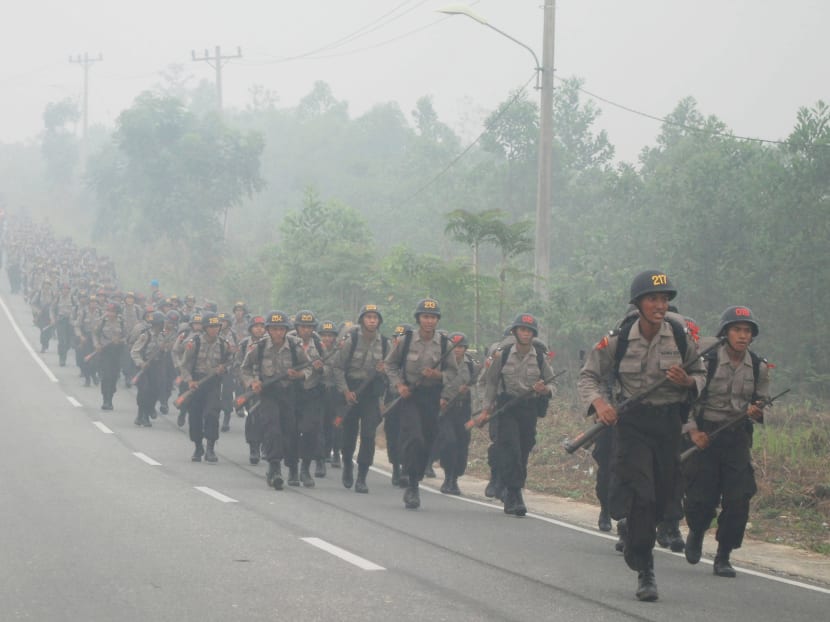Indonesia ‘must step up measures to tackle haze’
SINGAPORE — Non-governmental organisations (NGOs) working in Indonesia yesterday (Sept 30) called for more long-term solutions to tackle the haze and for concrete action to be taken during the three years that Indonesian President Joko Widodo had said was needed for “physical work” to be completed.

Students of Indonesia’s State Police School exercising in Pekanbaru, Riau province, on Sept 30, 2015. Indonesia has deployed more resources to contain the haze, which has affected the region in recent weeks. Photo: Reuters
SINGAPORE — Non-governmental organisations (NGOs) working in Indonesia yesterday (Sept 30) called for more long-term solutions to tackle the haze and for concrete action to be taken during the three years that Indonesian President Joko Widodo had said was needed for “physical work” to be completed.
In an exclusive interview with BBC News, Mr Widodo said Indonesia needs time to build temporary water reserves in forests and to dig canals for water to flow to the peat forests.
“I think we need three years for all the physical work to be completed and for you to see the result — but, I believe that there will be progress every year, too, because there is consistency in our approach,” he said.
He told BBC that Indonesia has deployed 3,700 military officers, 7,900 police officers, 18 helicopters and four planes for water bombing as part of its efforts to contain the haze, which has affected the region in recent weeks.
NGOs Greenpeace and WWF Indonesia said Mr Widodo’s efforts must include the building of dams to block canals in peatlands, to re-wet areas that have been drained.
The building of canals is a common practice for companies growing oil palm trees and trees for pulpwood on peatlands, but drainage of the wetlands — rich carbon stores made up of 90 per cent water and 10 per cent vegetation remains — causes them to be vulnerable to fires, said Mr Yuyun Indradi, Forest Campaigner at Greenpeace South-east Asia.
Mr Widodo’s comments about digging canals contradict his actions on a trip to Riau last November, where he helped build a number of dams across drainage canals, said Mr Yuyun.
“It’s proven canal damming has been effective in preventing and reducing fire.”
WWF Indonesia’s collaboration with Indonesia’s Ministry of Environment and Forestry to build 1,700 dams in Sebangau National Park in Central Kalimantan has led to the reduction of hot spots in the area, said its conservation director Arnold Sitompul.
After the damming of canals to re-wet drained peat, there should be reforestation, said Dr Sitompul.
“We are encouraging the government to enforce moratorium in peatlands, while strict law enforcement must be applied to ensure zero fire and zero burning … in all peatlands already (in) concession (areas),” he said.
Concessions are areas that companies have been allowed to develop.
Mr Yuyun called on Mr Widodo to share more details of his three-year plan so the public may help to monitor, and participate.
He also suggested that the damming of canals be made into a “national movement” extending to Jambi, South Sumatra, Kalimantan and Papua.
Casting an eye on Mr Widodo’s broader plans for Indonesia, Mr Yuyun was concerned that more forests could be sacrificed to grow more food and to mine coal for power plants.
The President’s recent announcement that he would deregulate and simplify the process of obtaining business permits to lure investments could also undermine efforts to revoke permits of errant companies behind the haze, Mr Yuyun said.
“On one hand, he (Mr Widodo) wants to revoke, but on the other hand he wants to make it easier to get new permits — that’s also quite contradictory,” he added.
“I appreciate any plan that comes from the government to tackle this problem but, again, the government has to be clear and transparent on the plan and … educate the public.”
Some experts have estimated that fires in Indonesia this year, up until Sept 22, have released greenhouse gases equivalent to about 600 million tonnes.
The estimate by the Global Fire Emissions Database, which produces regional and global estimates of fire emissions based on data from 1997 to the present, was published by NASA’s Earth Observatory together with satellite images that were acquired last Thursday.
NASA’s Earth Observatory quoted Columbia University scientist Robert Field as saying 2015 could rank among the most severe burning events on record for Indonesia.






